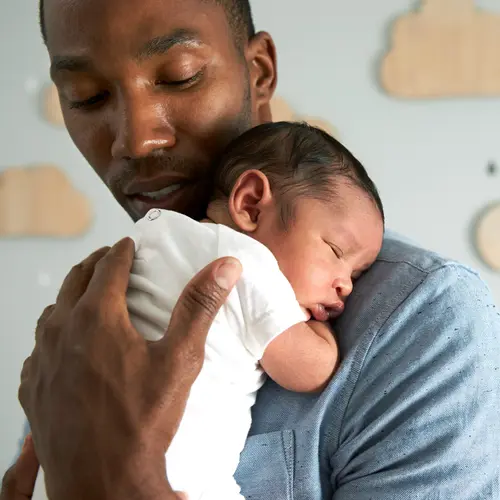Our babies inherit a lot from us: our height, our hair color -- and our tendency toward sensitive skin, including eczema.
If someone in your immediate family has allergic tendencies, eczema may be the first sign that your baby shares that tendency, too, says pediatrician Chris Tolcher, MD, clinical assistant professor of pediatrics at the University of Southern California School of Medicine.
Eczema can start as early as your baby's second month. Symptoms can be mild and barely noticeable, or itchy and intense. Know the signs of baby eczema, how to treat it, and what eczema treatments to avoid.
9 Signs of Baby Eczema
Symptoms of eczema in babies include skin that is:
- Dry
- Tender
- Red
- Scaly
- Cracked
- Thick or leathery
- Itchy
- Crusting or oozing
- Has circular patches of red areas or light areas
Some of the symptoms above can indicate other problems such as diaper rash. So, don't assume your baby has eczema. Talk to your baby's pediatrician before treating the skin problem.
Baby Eczema: Top Tips for Treatment
Eczema, sometimes called infantile eczema, or atopic dermatitis, is a chronic inflammation of the outer layers of skin. The condition most often appears in children, though many outgrow it as they get older. For more severe cases of eczema, here are seven tips for treatment:
1. Avoid triggers.The problem with eczema is that skin is easily irritated, so "the main treatment is avoiding irritants," Tolcher tells WebMD. Triggers that may irritate your baby's eczema include:
- Dry air
- Animal dander
- Pollen, mold, and dust
- Harsh soaps and detergents
- Heat and sweating
2. Avoid scented products. What irritates eczema varies with each baby, says Tolcher, but start by avoiding fragrances in all products that touch baby's skin, including soaps, shampoos, and lotions. Opt instead for mild body soaps or soap-free cleansers such as Aquaphor Gentle Wash, Basis, Cetaphil, Dove, or Eucerin. Also avoid perfumed laundry detergents, fabric softeners, and dryer sheets, and select "baby friendly detergents" such as All Free and Clear, Dreft, Ivory Snow, and Purex.
3. Moisturize. Moisturizing is the foundation of healthy skin for people with eczema, says California dermatologist Wendy E. Robert, MD. You can soothe your baby's eczema symptoms by moisturizing skin at least two or three times daily, using a fragrance-free, hypoallergenic product. Look for oil-based ointments. These help lock in moisture better than lotions, which contain more water.
4. Use eczema creams. Creams that contain colloidal oatmeal or mild hydrocortisone can help ease itching and skin irritation. Some steroid creams may be too potent for infants, Tolcher says. Before using steroids on your baby's eczema, always consult your doctor. And don't use hydrocortisone creams for longer than a week unless advised by your baby's doctor.
5. Consider oral antihistamines. Oral antihistamines like Benadryl, Claritin, and Zyrtec, may help if your baby's itch is severe, says Tolcher. But consult with your pediatrician before giving your baby these medicines.
6. Keep cool. Hot water strips the body of skin-protecting oils, Roberts tells WebMD, so be sure to bathe baby in lukewarm water -- and not too often -- then moisturize soon after.
7. Avoid dietary changes. Certain foods can be an eczema trigger for some babies, but "sorting that out can be very challenging," Tolcher says. "Don't eliminate foods from your baby's diet without the supervision of your doctor."
That's really the take-home message when treating your baby's eczema symptoms: Talk to your pediatrician. Your doctor can verify that baby's symptoms are eczema, and can help you pick the eczema treatments that are just right for baby's sweet, sensitive skin.

